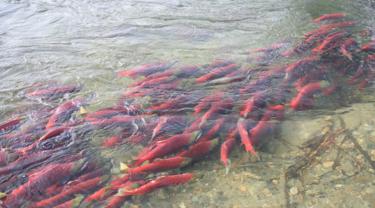Before the huge wooden boats cleaved their way across the ocean to land on North American shores, the First Nations people were already fishing with nets, hooks, and long-lines to feed their families and survive.
Fish like cod, haddock, and salmon were an essential part of the Aboriginal diet and delicious recipes were handed down from generation to generation.
A member of Esketemc First Nation (formerly known as Alkali), Ellen Melcosky, founder and president of Little Miss Chief Gourmet Products Inc. claims nobody prepared salmon like her mom. “No one cooked it better!” she cheerily exclaimed.
Little Miss history
Melcosky grew up in the Chilcotin, on the west side of the Fraser River in British Columbia. With no running water, Melcosky and her family lived off the land, growing gardens lined with carrots, potatoes, and onions, which were stored in root houses during winter.
Eventually marrying and moving to the Okanagan in B.C., Melcosky put her family first. “My husband worked the mining industry and worked away from home a lot. It was our choice that I not work and stay at home and raise the children,” she said. “When the last of our children was near graduation I really had the longing to go to work again. I wanted to spread my wings like that big eagle that I love so much.”
Realizing that she needed to upgrade her education to re-enter the workforce, Melcosky enrolled in continuing education, eventually landing a job at the Westbank First Nations Intertribal Forestry Association. It was there she first got the idea of marketing her salmon. “During this time my mother had given me the secret brining recipe and I was really feeding the neighbors, big time!”
Constantly experimenting with mom’s recipe through the years, she incorporated the use of dry white wine into the brining method. Armed with start-up funding from family, friends, and the Women’s Enterprise Society, as well as business plan created by the Canadian Executive Service Organization (CESO), Ellen resolutely began to market her salmon under the Little Miss Chief label.
Eaton’s turned out to be her biggest account in the first year of business, bringing in $140,000.
Not all salmon is the same
Each of the five species has a unique flavour and nutritional makeup. Sockeye salmon, with its firm flesh and richness, is always a favourite among salmon aficionados.
Originally, Little Miss Chief only used wild sockeye salmon. However, with species sustainability in mind, they made the switch to wild keta salmon – equal to sockeye in quality and texture, but with a subtler flavour because of a lower fat content. If you’re counting calories, wild keta is a great option as well.
Modern packaging for a traditional product
The cooking process involves filleting and marinating the fish with wine and spices, which is later slowly smoked over natural woodchips. Using no preservatives or colours, the salmon is quickly packaged into gold foil retort pouches and thermally processed in steam.
Considered the most significant advance in food packaging since the metal can, the retort pouch is a flexible, laminated food package offering the shelf stability of cans, coupled with the texture and nutrient retention associated with frozen food packaging. Shelf-stable for a minimum of five years, Little Miss Chief salmon requires no refrigeration until opened.
The plant and retort process is registered with the federal Department of Fisheries and Oceans Canada, the Federal Drug Administration (FDA) in the U.S., and the European Economic Community (EEC).
Nothing fishy about success
Currently, Little Miss Chief products can be found in the Netherlands, Poland, and the U.S. Exports only account for 15 per cent of overall sales, but with an aggressive marketing campaign abroad, Ellen predicts a steep rise in exports in the very near future.
Little Miss Chief received a Mishtapew Awards finalist award from the First Peoples Business Association, as well as the 2001 Canada Export Award, the 2009 B.C. Aboriginal Business award, the 2010 National Aboriginal Achievement Award (now Indspire), and the 2010 Westbank & District Chamber of Commerce’s Key Business Award (sponsored by Westbank First Nation).
“I know I never could have done this without my husband,” says Melcosky. “He always believed in my dream, encouraging me and supporting me 100 per cent.”
In addition to the support from her family and friends, there are the hundreds of thousands of consumers worldwide who have come to love the smoked salmon made from her family recipe, passed down from her grandmother’s grandmother.
Get more export insights from Little Miss Chief’s Ellen Melcosky here.





